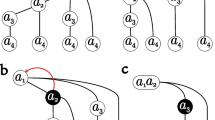Abstract
One key challenge in Formal Concept Analysis is the scalable and accurate computation of stability index as a means to identify relevant formal concepts. Unfortunately, most exact methods for computing stability have an algorithmic complexity that could be exponential w.r.t. the context size. While randomized approximate algorithms, such as Monte Carlo Sampling (MCS), can be good solutions in some situations, they frequently lead to the slow convergence problem with an inaccurate estimation of stability. In this paper, we introduce a new approximation method to estimate the stability using the low-discrepancy sampling (LDS) approach. To improve the convergence rate, LDS uses quasi-random sequence to distribute the sample points evenly across the power set of the concept intent (or extent). This helps avoid the clumping of samples and let all the areas of the sample space be duly represented. Our experiments on several formal contexts show that LDS can achieve faster convergence rate and better accuracy than MCS.
Access this chapter
Tax calculation will be finalised at checkout
Purchases are for personal use only
Similar content being viewed by others
Notes
- 1.
The convergence rate quantifies how quickly the sampling error decreases with an increase in the number of samples.
- 2.
Note that since both \(\sigma _{\text {in}}(c)\) and \(\sigma _{\text {ex}}(c)\) provide dual measurements, we generally use \(\sigma (c)\) throughout the rest of the paper.
- 3.
Publicly available: http://fimi.ua.ac.be/data/.
- 4.
Publicly available: https://pypi.python.org/pypi/concepts.
- 5.
Publicly available: http://people.sc.fsu.edu/~jburkardt/py_src/sobol/sobol.html.
References
Alpen, É.: Précis de Phytotérapie. Édition Alpen (2010). www.alpen.mc/precis-de-phytotherapie
Babin, M.A., Kuznetsov, S.O.: Approximating concept stability. In: Domenach, F., Ignatov, D.I., Poelmans, J. (eds.) ICFCA 2012. LNCS (LNAI), vol. 7278, pp. 7–15. Springer, Heidelberg (2012). https://doi.org/10.1007/978-3-642-29892-9_7
Bache, K., Lichman, M.: Mushroom data set (2013). http://archive.ics.uci.edu/ml
Belohlavek, R., Macko, J.: Selecting important concepts using weights. In: Valtchev, P., Jäschke, R. (eds.) ICFCA 2011. LNCS (LNAI), vol. 6628, pp. 65–80. Springer, Heidelberg (2011). https://doi.org/10.1007/978-3-642-20514-9_7
Buzmakov, A., Kuznetsov, S.O., Napoli, A.: Is concept stability a measure for pattern selection? Procedia Comput. Sci. 31, 918–927 (2014)
Buzmakov, A., Kuznetsov, S.O., Napoli, A.: Scalable estimates of concept stability. In: Glodeanu, C.V., Kaytoue, M., Sacarea, C. (eds.) ICFCA 2014. LNCS (LNAI), vol. 8478, pp. 157–172. Springer, Cham (2014). https://doi.org/10.1007/978-3-319-07248-7_12
Caflisch, R.E.: Monte Carlo and quasi-Monte Carlo methods. Acta Numer. 7, 1–49 (1998)
Davis, A., Gardner, B., Gardner, M.: Deep South (1941). http://networkdata.ics.uci.edu/netdata/html/davis.html
Faure, H., Tezuka, S.: Another random scrambling of digital (t, s)-sequences. In: Fang, K.T., Niederreiter, H., Hickernell, F.J. (eds.) Monte Carlo and Quasi-Monte Carlo Methods 2000, pp. 242–256. Springer, Heidelberg (2002). https://doi.org/10.1007/978-3-642-56046-0_16
Ganter, B., Wille, R.: Formal Concept Analysis: Mathematical Foundations. Springer, New York (1999). https://doi.org/10.1007/978-3-642-59830-2. Translator C. Franzke
Klimushkin, M., Obiedkov, S., Roth, C.: Approaches to the selection of relevant concepts in the case of noisy data. In: Kwuida, L., Sertkaya, B. (eds.) ICFCA 2010. LNCS (LNAI), vol. 5986, pp. 255–266. Springer, Heidelberg (2010). https://doi.org/10.1007/978-3-642-11928-6_18
Kuipers, L., Niederreiter, H.: Uniform distribution of sequences. Courier Corporation (2012)
Kuznetsov, S., Obiedkov, S., Roth, C.: Reducing the representation complexity of lattice-based taxonomies. In: Priss, U., Polovina, S., Hill, R. (eds.) ICCS-ConceptStruct 2007. LNCS (LNAI), vol. 4604, pp. 241–254. Springer, Heidelberg (2007). https://doi.org/10.1007/978-3-540-73681-3_18
Kuznetsov, S.O.: Learning of simple conceptual graphs from positive and negative examples. In: Żytkow, J.M., Rauch, J. (eds.) PKDD 1999. LNCS (LNAI), vol. 1704, pp. 384–391. Springer, Heidelberg (1999). https://doi.org/10.1007/978-3-540-48247-5_47
Kuznetsov, S.O.: On stability of a formal concept. Ann. Math. Artif. Intell. 49(1), 101–115 (2007)
Kuznetsov, S.O., Makhalova, T.P.: Concept interestingness measures: a comparative study. In: Proceedings of the Twelfth International Conference on Concept Lattices and Their Applications, Clermont-Ferrand, France, 13–16 October 2015, pp. 59–72 (2015)
Kuznetsov, S.O., Makhalova, T.P.: On interestingness measures of formal concepts. CoRR abs/1611.02646 (2016)
Landau, D.P., Binder, K.: A Guide to Monte Carlo Simulations in Statistical Physics. Cambridge University Press, Cambridge (2014)
Lemieux, C.: Monte Carlo and quasi-Monte Carlo sampling (2009)
Muangprathub, J.: A novel algorithm for building concept lattice. Appl. Math. Sci. 8(11), 507–515 (2014)
Niederreiter, H.: Random Number Generation and Quasi-Monte Carlo Methods. SIAM, Philadelphia (1992)
Owen, A.B.: Monte Carlo extension of quasi-Monte Carlo. In: Simulation Conference Proceedings Winter, vol. 1, pp. 571–577. IEEE (1998)
Roth, C., Obiedkov, S., Kourie, D.G.: On succinct representation of knowledge community taxonomies with formal concept analysis. Int. J. Found. Comput. Sci. 19(02), 383–404 (2008)
Schretter, C., He, Z., Gerber, M., Chopin, N., Niederreiter, H.: Van der corput and golden ratio sequences along the hilbert space-filling curve. In: Cools, R., Nuyens, D. (eds.) Monte Carlo and Quasi-Monte Carlo Methods, vol. 163, pp. 531–544. Springer, Cham (2016). https://doi.org/10.1007/978-3-319-33507-0_28
Zhi, H.L.: On the calculation of formal concept stability. J. Appl. Math. 2014, 1–6 (2014)
Acknowledgment
We acknowledge the financial support of the Natural Sciences and Engineering Research Council of Canada (NSERC).
Author information
Authors and Affiliations
Corresponding author
Editor information
Editors and Affiliations
Rights and permissions
Copyright information
© 2018 Springer International Publishing AG, part of Springer Nature
About this paper
Cite this paper
Ibrahim, MH., Missaoui, R. (2018). An Efficient Approximation of Concept Stability Using Low-Discrepancy Sampling. In: Chapman, P., Endres, D., Pernelle, N. (eds) Graph-Based Representation and Reasoning. ICCS 2018. Lecture Notes in Computer Science(), vol 10872. Springer, Cham. https://doi.org/10.1007/978-3-319-91379-7_3
Download citation
DOI: https://doi.org/10.1007/978-3-319-91379-7_3
Published:
Publisher Name: Springer, Cham
Print ISBN: 978-3-319-91378-0
Online ISBN: 978-3-319-91379-7
eBook Packages: Computer ScienceComputer Science (R0)




